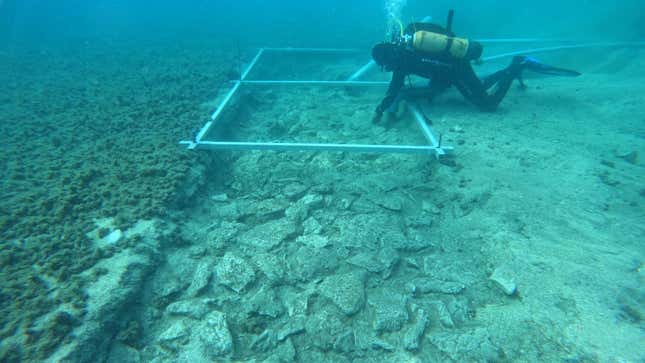
Have you ever looked at a many-thousands-year-old underwater road and thought, “Wow that looks a lot like my street’s pavement,”? Well, now is your chance. Archaeologists recently discovered the sunken ruins of a 7,000-year-old road (dating back to 4,900 BC) that apparently once linked an ancient artificial landmass to the island of Korčula in Croatia.
In case you missed it:
- New Cars Really Are Just For Rich People Now
- 10 Wildest Cheats, Codes and Easter Eggs in Racing Game History
- Chrysler Airflow, Mitsubishi Delica, Toyota Land Cruiser: The Dopest Cars I Found for Sale Online
The road — and several other artifacts like flint blades, stone axes and fragments of millstones — actually belonged to a lost maritime culture known as the Hvar. They occupied the area during the Neolithic Era.
The ruins were found just 15 feet below the surface of the Bay of Gradina, on the western coast of Korčula by Igor Borzić, a researcher at the University of Zadar’s Archeology Department, according to a Facebook post made by the university, and the archeologists were able to use a process called radiocarbon analysis to figure out just how old the settlement is. The University has also released new footage of the underwater “road” which is made of stacked stones that measures about 12 feet wide.
“In underwater archaeological research of the submerged neolithic site of Soline on the island of Korčula, archaeologists found remains that surprised them too. Namely, beneath the layers of sea mud, they discovered a road that connected the sunken prehistoric settlement of the Hvar culture with the coast of the island of Korčula,” the post said.
The post goes on to say that the research is a collaborative effort between several institutions, companies and scientists. Multiple other Hvar ruins and artifacts have been discovered underwater. Those discoveries include a settlement that was constructed on top of an artificially created island. That’s where our road comes in. It connected that island to the coast of Korčula.
Archeologists aren’t just looking underwater, though. They are apparently also excavating ancient sites on land as well, including a cave in the nearby town of Vela Luka. According to Vice, that little town has been occupied for at least the past 19,000 years by a number of different cultures, including the Hvar.